#Renaissance politics
Explore tagged Tumblr posts
Text
"The court is rife with intrigue and betrayal, with everyone seeking to secure their own position and avoid the King's wrath." (Letter to Charles V, 1537)

Eustace Chapuys, the son of Louis and Guigonne Dupuys, was a Savoyard diplomat who served Charles V as Imperial ambassador to England from 1529 until 1545 and is best known for his extensive and detailed correspondence.
Born: 1489, Annecy, Annecy, France Died: 21 January 1556 (age 67 years), Leuven, Belgium
#Diplomat#Ambassador#Spanish envoy#Tudor court#Henry VIII#Anne Boleyn#Catherine of Aragon#Reformation#Imperial ambassador#Holy Roman Empire#Renaissance politics#Chronicler#Historical figure#16th century#Court intrigues#Religious conflict#Political maneuvering#Habsburg representative#English Reformation#European diplomacy#quoteoftheday#new blog#today on tumblr
2 notes
·
View notes
Text
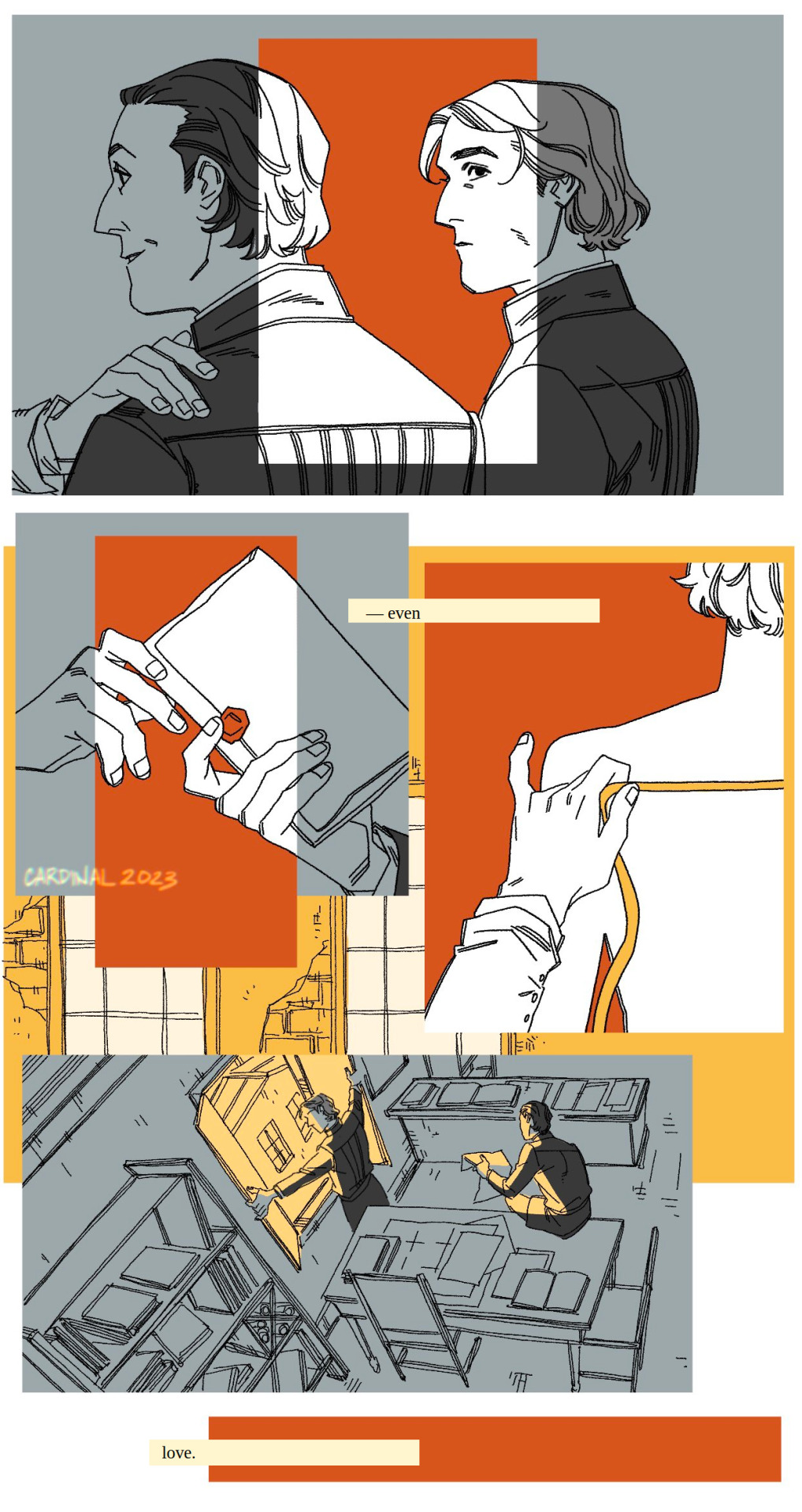
niccolo machiavelli & biagio buonaccorsi

Machiavelli's Service to the Republic, John M. Najemy
eventually I'll read Sasso's writing on Machiavelli, but even reading Najemy's summary of the text with regards to Biagio and Machiavelli's relationship made me feel unwell™ in some kind of way like. even love. what an absolute gut punch pair of words to put in the middle of a sentence. I feel fine about it!! (a lie)
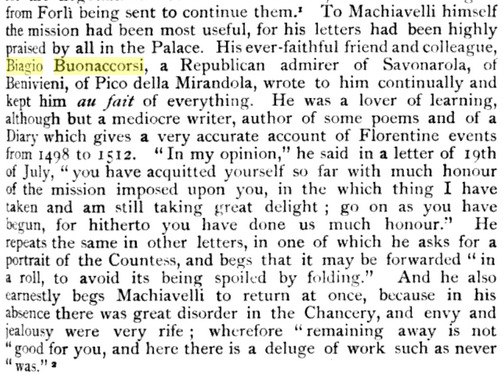
The Life and Times of Machiavelli, Pasquale Villari
AND NOW. regarding the scene. the letter exchanging hands is referencing their correspondence in general, but to also how Biagio was a collaborator to Machiavelli's plans (and a little bit about how some of Machiavelli's works were copied in Biagio's hand)
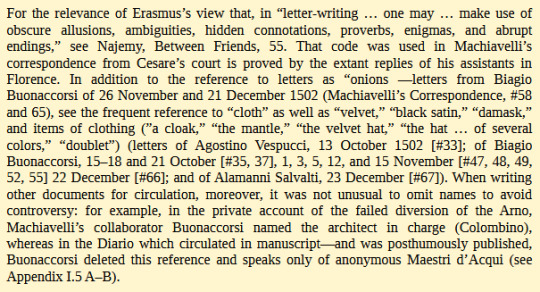
Machiavelli, Leonardo and the Science of Power, Roger D Masters
and regarding the red panel with the figure getting measured, it's about how Biagio had clothing for Machiavelli made to his own measurements in Machiavelli's absence.
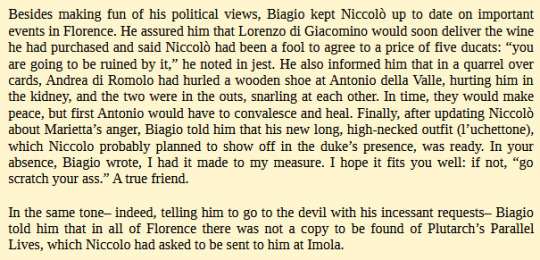
Niccolò’s Smile, Maurizio Viroli
#italian renaisance tag#niccolo machiavelli#biagio buonaccorsi#komiks tag#drawing tag#i had an illustration of milo murdering clodius for today but then i saw there was a poll for it so i'll save it for after the poll closes#god i feel so so so so so so normal about machiavelli and biagio (i do not)#ive always felt a lot about machiavelli but biagio makes me cry. he's just. aughhhhdhgh.#anyway based on najemy's summary of sasso's text i dont think. i agree with what sasso is saying abt their dynamic wrt#to the emotional underworking and biagio overplaying the political threats#as najemy goes to say in his follow up. other people were also warning machiavelli abt the same thing#but biagio's frustrations remind me a lot of maria's complaints as well. it's like. devotion + loyalty + trust. i think are the stronger#ties at play. eugh. EUAHDGHSHSHDGH#im going to listen to the assassins creed 2 soundtrack and be normal about everything now. good night#italian renaissance tag
276 notes
·
View notes
Text
quoting my sister here because holy shit i never heard this put into perspective this way and she's so fucking right
"Jesus was rejected by society alone, and by supporting those who shut out minorities and other cultures, we might just be shutting out his own reincarnation. if anything minorities such as different races and those part of the LGBTQ have a closer connection to *heaven* itself. Being close-minded leads us to believe a false prophet"
using religion as your excuse to be a bigot goes directly against the teachings
#us politics#donald trump#elon musk#fuck trump#me drinking the juice that turns me into a enlightened Renaissance thinker#i let her type the paragraph btw
20 notes
·
View notes
Text
Fëanorian Week 2023, Day 2: Maglor
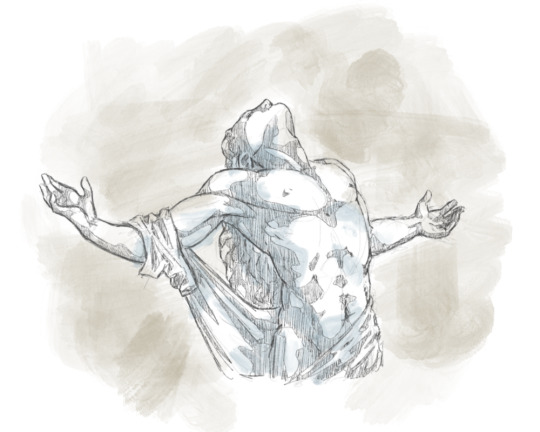
It took me no fewer than half a dozen attempts to even get a sketch I liked for Maglor. I kept trying to include an instrument into the composition of the piece but they all just looked so weird and out of place until I realized: stone statues don’t often have instruments in them because there are just too many fragile elements. So I just left it out and finally it started coming together.
That being said, I originally raised the question of which instrument would be best in a Maglor drawing to my friend group before I had fully decided on a pose for him. We were bouncing between panpipes and a lute when one said “maracas LOL” and I realized that I had just been granted the opportunity to create one of the most blursed images I’ve ever set to paper or tablet. So here you go: Maracglor.

Just out of frame are Finrod on the steel pans and Fingon on bongos.
#feanorianweek#maglor#the man the myth the legends#three shinies#my trash#/end classification tags#this week featuring: carefully draped stone cloth#i ain't getting reported today no sir#i'm toeing the line but i don't feel like losing this blog#everyone gets polite little modesty drapes#(which to me suggests i've strayed from emphasis on greek sculpture to renaissance sculpture when taking inspiration for these)
214 notes
·
View notes
Text
begging for more interesting worldbuilding conversation fr. like i wanna know what the zodiac equivalent is. do people flex that they were born under the warrior or the maiden’s star? let me know about the essos-westeros spice trade. what about valyrian epics? were they influenced by earlier ghiscari literature? what about the art. where are all the art movements in westeros.
#asoiaf#guava.txt#more worldbuilding.#westeros renaissance takes place in highgarden then moves to oldtown#tyrell bastard botticelli#also more on non-maester written literature. the personal diaries poets etc let’s hear abt them#the riverlands is where expressionism begins. a generation born out of war in a region built by war.#riverlands art would be inherently political. no academic painters there! portraying emotional portrayals not reality#asoiaf worldbuilding
107 notes
·
View notes
Text
The Philosophy of Shakespeare
The philosophy of Shakespeare refers to the exploration of philosophical themes, questions, and ideas within the works of William Shakespeare. While Shakespeare was not a philosopher in the traditional sense, his plays and sonnets are rich with philosophical insights that address issues related to human nature, ethics, politics, love, fate, identity, and the human condition. Scholars and readers alike have long examined how Shakespeare’s writings engage with philosophical concepts and how these concepts are dramatized through his characters and narratives.
Key Themes in the Philosophy of Shakespeare:
Human Nature and the Human Condition:
Complexity of the Human Psyche: Shakespeare's characters are known for their psychological depth and complexity. His works explore the multifaceted nature of human beings, including the tensions between reason and emotion, ambition and morality, and appearance and reality.
The Tragic Flaw (Hamartia): Many of Shakespeare’s tragedies revolve around the concept of a tragic flaw, a characteristic that leads to the downfall of the protagonist. This theme raises philosophical questions about free will, fate, and the moral consequences of human actions.
Ethics and Morality:
Good and Evil: Shakespeare’s works frequently grapple with the nature of good and evil, exploring the moral ambiguities of his characters' actions. Plays like Macbeth and Othello delve into the corrupting influence of power, jealousy, and ambition.
Justice and Revenge: The tension between justice and revenge is a recurring theme, particularly in plays like Hamlet and The Merchant of Venice. These works examine the ethics of retribution, the consequences of revenge, and the pursuit of justice.
Fate and Free Will:
Destiny and Choice: Shakespeare often explores the tension between fate and free will, questioning the extent to which characters are in control of their own destinies. Romeo and Juliet and Macbeth are notable examples where the characters' actions seem predestined, yet their choices play a crucial role in their outcomes.
Prophecy and Foreknowledge: The use of prophecy, as seen in Macbeth and Julius Caesar, raises philosophical questions about whether knowledge of the future alters the course of events or if it leads inevitably to the fulfillment of that future.
Identity and Self-Knowledge:
The Fluidity of Identity: In plays like Twelfth Night and As You Like It, Shakespeare explores the fluidity of identity, particularly through themes of disguise and mistaken identity. These themes challenge the fixed nature of identity and raise questions about self-knowledge and authenticity.
Self-Deception: Characters in Shakespeare’s plays often engage in self-deception, either out of pride, fear, or desire. This theme is particularly prominent in King Lear and Hamlet, where characters’ inability to see themselves or their situations clearly leads to tragedy.
Politics and Power:
The Nature of Authority: Shakespeare’s historical plays and tragedies frequently address the nature of political power and authority. Richard III, Henry V, and Julius Caesar explore the ethics of leadership, the legitimacy of rulership, and the corrupting influence of power.
The Body Politic: The metaphor of the body politic, where the state is likened to a human body, is a recurring theme. In plays like Coriolanus and Measure for Measure, Shakespeare examines the health of the state and the moral responsibilities of rulers.
Love and Relationships:
Romantic Love: Shakespeare’s comedies and tragedies offer deep reflections on the nature of love, its joys, and its perils. Plays like Romeo and Juliet and Much Ado About Nothing explore the idealization of romantic love, the pain of unrequited love, and the complexities of human relationships.
Friendship and Loyalty: Beyond romantic love, Shakespeare also delves into themes of friendship and loyalty, as seen in The Merchant of Venice and Julius Caesar. These relationships often raise questions about the conflicts between personal loyalty and public duty.
Appearance vs. Reality:
Illusion and Truth: Many of Shakespeare’s plays involve themes of appearance versus reality, where characters and situations are not what they seem. Hamlet and Othello are prime examples of how deception and the search for truth drive the plot and philosophical inquiry.
Theatricality of Life: Shakespeare often blurs the line between reality and performance, as seen in As You Like It's famous "All the world's a stage" monologue. This raises philosophical questions about the nature of reality, the roles people play in life, and the construction of identity.
Mortality and the Meaning of Life:
Death and the Afterlife: Shakespeare’s works are deeply concerned with mortality, the fear of death, and the unknown aspects of the afterlife. Hamlet's "To be, or not to be" soliloquy is one of the most famous meditations on existence and the fear of what comes after death.
The Transience of Life: The fleeting nature of life and the inevitability of death are recurrent themes, particularly in Shakespeare’s sonnets and tragedies. These reflections often lead to a broader contemplation of the meaning and value of life.
Philosophical Skepticism:
Doubt and Certainty: Shakespeare’s characters often grapple with doubt and uncertainty, questioning their beliefs, their perceptions, and the world around them. This skepticism is evident in Hamlet's introspection and in King Lear's descent into madness.
Relativism and Perspective: Shakespeare frequently presents multiple perspectives within his plays, allowing for a relativistic view of truth and morality. This multiplicity of viewpoints invites the audience to question the nature of truth and the reliability of perception.
The philosophy of Shakespeare is not a unified doctrine but rather a rich and varied exploration of fundamental human concerns. Through his characters and narratives, Shakespeare engages with philosophical questions about human nature, morality, power, love, identity, and existence. His works continue to inspire philosophical inquiry, offering insights that are as relevant today as they were in the Elizabethan era.
#philosophy#epistemology#knowledge#learning#education#chatgpt#ethics#psychology#Shakespeare#Philosophy of Literature#Human Nature#Morality#Ethics#Fate and Free Will#Identity and Self-Knowledge#Politics and Power#Love and Relationships#Appearance vs. Reality#Mortality#Philosophical Skepticism#Tragic Flaw#Shakespearean Tragedy#Renaissance Philosophy
11 notes
·
View notes
Text
My toxic trait is that I think I could actually write a really good thinly veiled Reylo romance novel. If I had world enough and time.
#option one: historical romance where kylo ren is evil initially because he's fighting for some kind of evil lord or king or whatever#just like a renaissance prince who loves poisoning people. nothing too heavy.#he has complicated--even convoluted--reasons#option two: contemporary and the first order is NOT a political movement#but a toxic grad-level arts program or poorly-run-to-the-point-of-maliciousness nonprofit#is this 'true' to the 'spirit' of 'the star wars sequel trilogy'#the answer is: i do not care enough about that#which is also toxic#anyway rey's deal is obviously still that she's a longtime orphan who doesn't know where her parents are or even who they were#which is doable in either case#honestly that's why i gave up on a certain existing example of that genre#she's gotta be a certain type of orphan!!!
7 notes
·
View notes
Text
From Pandemonium to Gotham: Is There Heroism in the Heart of the Anti-Hero?
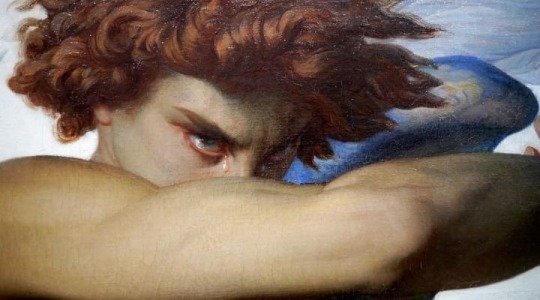
Men are not gentle creatures who want to be loved, and who at the most can defend themselves if they are attacked; they are, on the contrary, creatures among whose instinctual endowments is to be reckoned a powerful share of aggressiveness. (Freud)
Milton’s Paradise Lost and Nolan’s The Dark Knight deliver two of the most compelling anti-heroes in Satan and the Joker, respectively. Both characters offer a fascinating exploration into the shadows of heroism, where the line between hero and villain blurs into intriguing moral ambiguity.
Satan, once the brightest angel, now the proudest fallen, declares from the fiery abyss, “Better to reign in Hell than serve in Heaven.” His defiance against divine authority is portrayed with an eloquence that almost makes you root for him. This isn’t just a rebellion; it’s a tragic fall from grace, wrapped in the grandeur of self-assertion and liberty.
Switching to the grimy streets of Gotham, the Joker turns the city into his anarchic playground. With a grin, he challenges the very foundations of order: “Introduce a little anarchy. Upset the established order, and everything becomes chaos. I’m an agent of chaos.”
Unlike Satan’s celestial coup, the Joker’s methods are terrestrial and visceral, striking fear and fascination in equal measure.
Freud would likely argue that our fascination with these figures is due to their embodiment of the id’s desires—unrestrained, primal, and taboo. Jung might add that they reflect our shadow selves, the parts of our psyche that we are both drawn to and frightened of. Sociologically, figures like Durkheim would interpret our collective captivation as a break from the normative monotony of societal life, where such extreme deviations from the norm temporarily unify society in their wake.
Yet, their appeal is paradoxical. While intellectually stimulating, their philosophies, when stripped of glamor, reveal a landscape of chaos and destruction. This brings us to a complex realization: we are drawn to the idea of breaking free from constraints, but the reality of such freedom, as embodied by Satan and the Joker, is often catastrophic.
These reflections prompt us to question not only the nature of heroism but also the underpinnings of our moral and societal structures. Are these anti-heroes, with their profound challenges to order and morality, carrying a torch of truth, or are they merely reflecting our own hidden desires for disruption and change?
In a world grappling with power dynamics and authority, characters like Milton’s Satan and Nolan’s Joker challenge the established order, prompting us to reflect on the socio-political structures that govern us. Their narratives stir debates on freedom, control, and the moral complexities of rebellion against oppressive systems.
#gotham#writers on tumblr#light academia#dark academia#dark aesthetic#dark art#fallen angel#poets on tumblr#writeblr#studyblr#batman#satan#spilled thoughts#funny memes#paradise#political activist#aesthetic#literature#poetry#painting#renaissance#artists on tumblr#photography#quotes#love
28 notes
·
View notes
Note
motogp athlete isekai'd into renaissance italy and forced into a marriage of convenience with lucrezia borgia's best friend
genuinely lucrezia’s only friends are her brother who she is in love with and her parents and her dad’s mistress and maybeeee micheletto on a GOOD day. so it’s marc x micheletto in this i guess. which is crazy
#micheletto like and here is how you garrote somebody:#marc eyes HUGE smile frozen distantly polite extremely mad there are not motors invented yet: wow that’s so interesting !#motogp#callie speaks#asks#marc could pull late seasons lucrezia off though i know we’ve assigned it to bezz/cele but the arc of losing your innocence#and embracing your power and controversial reputation… being ruthless and caring and people not liking you still hurting you#but not enough to stop your ambition…#also being in love with cesare theeeee GOD LOVES ME overprotective little schemer. like they COULD do rosquez. whatever#anyways. marc and micheletto at the renaissance gay bar……
7 notes
·
View notes
Text
Ce fut une torture pour moi d'aller voter étant donné que tous les grands partis sont absolument TERRIBLES (le Rassemblement national plus que problématique, le parti de Macron merdique et le NFP rempli de clowns) et tout ça pour que le RN passe largement en tête ?? Génial. Ravie de savoir que la majorité des citoyens de ce pays soutient l'extrême droite :/ (même si comme je l'ai déjà dit la dernière fois, vu l'état actuel du pays et de la gauche, ce n'est pas surprenant...).
De toute façon, en tant que femme + lesbienne + étudiante + pauvre je me fais baiser dans tous les cas, peu importe qui passe, donc je ne sais même pas pourquoi je râle
#french#France#french politics#frenchblr#french side of tumblr#tumblr français#élections législatives#assemblée nationale#nouveau front populaire#rassemblement national#renaissance
16 notes
·
View notes
Text
“O, let my land be a land where Liberty / is crowned with no false patriotic wreath, / but opportunity is real, and life is free, / equality is in the air we breathe. / (There’s never been equality for me, / Nor freedom in this ‘homeland of the free.’)”
Langston Hughes — Let America Be America Again
4 notes
·
View notes
Text
Feeling angry still today…
#us politics#anti capitalism#damag3#hidden renaissance#oj mountain#heycam#noir benny#Spotify#SoundCloud
2 notes
·
View notes
Text
tumblr is a breath of fresh air no n@zi crypt0 r1ght w1ng ads every 5 seconds..... don't have to think abt who looks at my stories or DMs as much.... no 5 diff types of short form media like reels stories shopping etc
#all for a tumblr renaissance like obv this place still has morons like any other internet but.#dont have to worry as much abt being put on a list or even worry abt being able to post shit re: politics and censorship#unlike twitter which will send cops to ur door and get u arrested for one tweet 😭#.txt
2 notes
·
View notes
Note
tapping the mic to say 🎤 when do u think the real shift in cesare and juans relationship happened and when did it begin to sour (or the audience could argue there were always notes of sourness and love mixed in together that just developed as time went on to be less fondness and more envy on both sides) bc lowkey ive been thinking the rift began when juan was chosen to go defend rome against king charles's army in s1 and cesare was desperate to don the armour and go and so when juan came back defeated, he was so ashamed with himself but cesare felt petty vindication and in this essay i will...[the audience cuts me off]
"He's not making excuses for what he is anymore, and what he wants to be. He ultimately feels that killing Juan was the right thing for himself. It's something that he focused on and I think he can control his mind into having no second thoughts. And that's the only way you can rule in that era, really." - Francois Arnaud
you're right! it's a mixture of sourness and love because, while cesare resented juan's weakness and naivety, but i think he still cared for him at first because he feels obligated to protect him since he was his family. but mainly, rodrigo's vicious cycle of ambitions tore them apart as he made cesare believe he was inadequate, despite loving, admiring, and relying on him. rodrigo's deliberate self-delusion (he is aware that cesare is the driven and more competent one) and self-loathing prevented him from embracing cesare's true self. appointing juan to a task desired by cesare fueled the hatred and envy as he started thinking juan was rodrigo's favorite. eventually, his frustration towards juan led him to murder him because this is where he becomes the cesare borgia we read about in machiavelli's 'the prince.' and like i said before, juan shaped the rest of cesare's story till the end. he was the one who drove him to finally become what he always meant to be and take the path he was always destined to. it's why juan's death is necessary to him because it was also a way for rodrigo to release him from his position as a cardinal. he claimed to rodrigo that he killed juan because he brought dishonor to the family, but cesare pretty much did contribute to bringing dishonor to the family by not wanting to warn juan about ludovico's army coming his way at forli after machiavelli informed him about it. cesare could have spared his family from another failure but decided not to because his priority was to humiliate juan just to prove a point to rodrigo, that he is the better son. he even gaslit juan about it by telling rodrigo that he wasn't aware of the attack, which makes cesare self-contradicting, just like how he went all "we're borgias, we never forgive" while killing juan because he was well aware juan struggled all his life questioning himself if he was truly rodrigo's son or not and desperately wanted to belong. cesare very decidedly excluded juan because he wanted to even emotionally hurt him in his final moment, then later was begging for "forgiveness" from rodrigo, a borgia, after the murder. also rodrigo feels a great deal of guilt (as he was hallucinating and dreaming of juan in s3) for making juan envied by cesare which led him to the decision to murder him, as that was the only way for cesare to gain his father's attention and the papal army. and when rodrigo finally forgives cesare for his sin of fratricide, rodrigo also forgives himself of the blame he's placed upon himself and the guilt he feels for letting his ambition destroy his family. they finally let go of the past and rodrigo can finally embrace cesare for the person he really is and has always loved deeply.
"he loves his errant son, does he not? More than he loves his dutiful one." - Cesare Borgia
cesare was proven wrong after all the time he was thinking juan was the favorite. he came to the realization that even though rodrigo saw so much of himself in him, he still planned from the beginning to make cesare his true heir. this brought relief and a sense of validation after years of feeling inadequate. rodrigo always intended for cesare to succeed him in the church, which was the only way that truly mattered to him. he made cesare a cardinal, a prince of the church, with the ultimate goal of cesare becoming the future pope and king. when rodrigo shared his dream of creating a papal bloodline to be passed down to cesare and his own son, cesare's perspective shifted. he began to heavily care about the perceptions of others, which not only fueled his power hunger but also led to him becoming classist. he even felt ashamed of his mother when she offered him counsel and to join him in war, rejecting her because of her former occupation as a "whore." it was a chilling development in cesare's character and honestly he became more interesting to me than he was in the first two seasons.
"One thing that I've always said about Juan is that every action that he does is heartfelt and genuine. When it was the war against the French, he was there and he was going to go to war, even though he knew he was going to die. He saw them getting ripped apart, but he was there and he was going to do it. I believe if Lucrezia hadn't come over, he would have led all his troops into death. I don't think there's anything that he's done which was through general cowardice. In terms of his survival, he died how he lived, and that's laudable, in itself." - David Oakes
rodrigo sending juan to war against the troops definitely (and rightfully) triggered cesare because juan has no idea what the hell he is doing and even though juan is incompetent, he never asked for the position he was given, but he tried his best to fulfill his responsibilities. like when he showed bravery by willingly risking his life against the french, even after his troops were torn apart in front of his eyes, insisting to lucrezia that he would never accept defeat and that he will keep fighting because he'll never let king charles of france destroy rome and get rid of their father, but only surrendered because the prospect of him dying would upset lucrezia, and lucrezia told him she already had a plan to prevent this.
"It’s interesting that Juan’s attempt at relieving pain is through closeness and hugging and love. When he forgives Cesare at the end saying how they’re brothers and wants to be together, I think that’s genuine. That’s the first time you realize what he’s always wanted." - David Oakes
juan felt deeply isolated because he never had a peer, and unfortunately, he was too weak and succumbed to his darkness, impulsiveness, and insecurities. he had a deep love for his family, but he lost himself in the pressure of the role and even committed heinous acts to prove himself, unaware that it would make his siblings hate him. all he wanted was to be included in their world. however, he struggled intensely in expressing his feelings, which led to him being shunned. it is tragic because ultimately he longed to feel like a 'true' borgia and have a close relationship with his family, especially with cesare. but the lack of moral guidance and the weight of expectations pushed him to behave inappropriately, resulting in everyone pushing him away and his death going unmourned except by his father, the one's responsible for his failure and feels guilty for it.
byeeee i really went on and on answering this oops sorry zaynab!!! anyway i hope these insights help lol
#loving the borgias fandom renaissance let's goooooo#what an epic family drama no one ever did it like them i love them all so much#never ask me a question about the borgias because i'm afraid i'm never shutting up#genuinely wondering if i'm gonna get attacked again by cesare fans for simply *checks notes* appreciating the source material#even though i'm obsessed with cesare as well and pretty much isn't delusional about him#in conclusion; cesare and juan's relationship is sooo one sided#it's very complex but to put it simply; cesare hates juan but juan loves cesare#if the situation was reversed at forli; juan would've warned cesare and rescue him byee#because cesare does everything ultimately for power and political gains and juan for wanting recognition and love i rest my case#zaynab 💌#messages#cesare borgia#juan borgia#rodrigo borgia#the borgias#juan and cesare#text post
17 notes
·
View notes
Text

Skeme Grafitti Artist
#Skeme#Graffiti#Melanin Art#Graff#Graffiti Legend#Renaissance#Cointelpro#Colonialists#Black Wall Street#Racist Spies#Racially Motivated Politics#White Supremacy#Negro Spirituals#Racists
3 notes
·
View notes
Text
god. this anderperry renaissance au is knocking me around some kind of way
#fair folk au is still very much going on i'm just working on some more worldbuilding for that one#in contrast the renaissance au is never going to be finished and i'm gleefully disregarding historical accuracy#- hence little snippets have been falling out of my pockets constantly#it's got EVERYTHING. political intrigue. religious imagery. todd faking his own death#the slow burn tragedy of a character moving from a good-humoured and idealistic boy#to a man who hesitates only for a moment about ordering the murder of two seven-year-olds#also Cameron gets religious guilt like there's no tomorrow#ALSO this thing somehow has a better political intrigue setup than the fair folk au??? augh. gotta work on that#although admittedly the worlds of 1450s Milan and 12th-century-fairy Ireland abide by very different laws#htoo writes#dead poets society#anderperry
44 notes
·
View notes